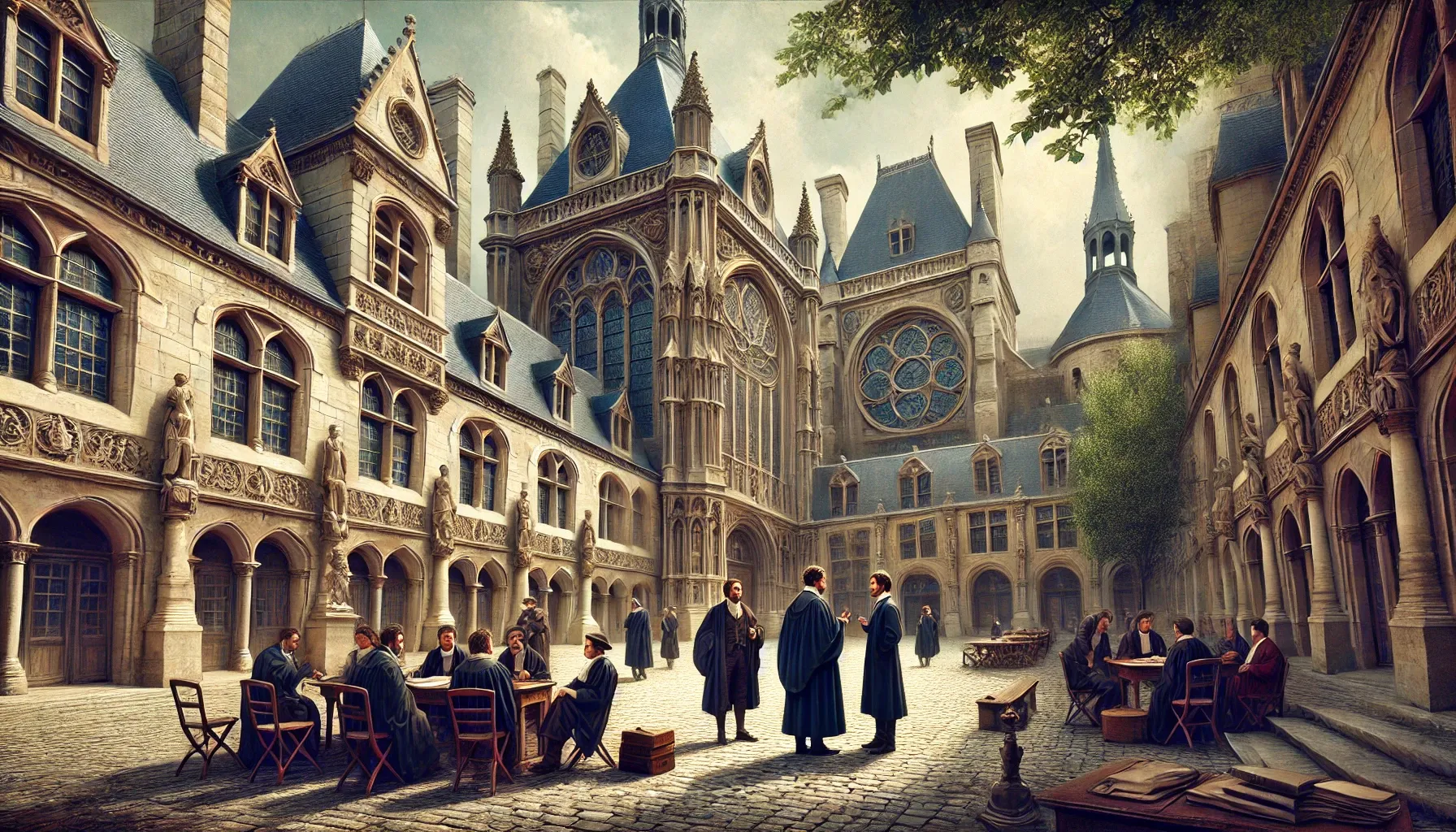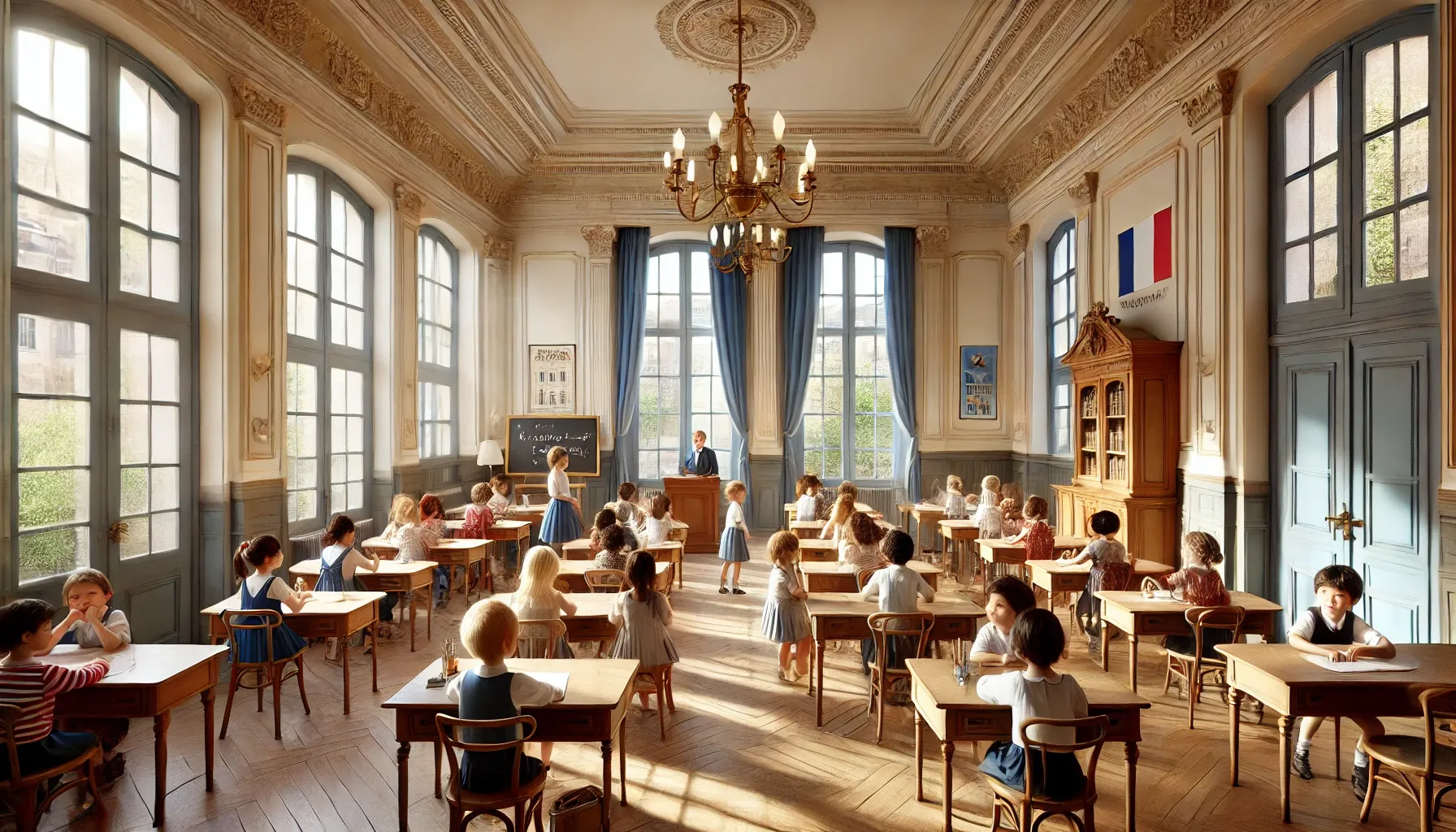What is the history of education in France and the Sorbonne's role in this process?

- Sorbonne: how does it influence education in France?
- How is the educational system in France organized?
- How is the education system in France organized for students after middle school?
Sorbonne: a mark of quality in education in France
Education in France cannot be imagined without mentioning the Sorbonne, one of the most important and oldest universities in Europe. This university was founded in Paris in the twelfth century and very quickly gained international popularity and prestige, especially in such fields as philosophy and theology.
For some time, diplomas issued by other educational institutions did not carry the same weight as those obtained from the Sorbonne. As early as the 13th century, the university implemented a system for awarding academic degrees.
It's interesting that before the establishment of the Sorbonne, there were various educational institutions associated with cathedrals in France, such as Notre-Dame de Paris, as well as with monasteries and abbeys, which provided quality education to their students.
Peculiarities of the educational process at the Sorbonne
Education at the Sorbonne was distinguished by the fact that, unlike religious educational institutions, this university focused on "artistic" traditions. However, theological disciplines also had their place.
The official head of the university was the Chancellor of Notre-Dame de Paris, although his powers were quite limited. Throughout the 13th century, faculties were active here, covering areas such as:
- theology
- law
- medicine
- art
Stages of development of the educational system in France
Modern educational trends in France began to take shape in the last decades of the 19th century, when the Third Republic was established. During that period, primary education became mandatory for children aged 6 to 13 years.
This led to a significant increase in the number of public primary schools and the implementation of a centralized teacher training system. In the 20th century, this area continued to develop actively, and the government enacted many important laws, resulting in all children aged 6 to 16 being required to receive an education by the 1980s.
Pre-school education in France
As for preschool education, it includes not only kindergartens but also nursery groups. Some parents prefer to enroll their children in such groups starting from the age of 4-6 months. Typically, there is one caregiver for every 4-5 toddlers.
Attending kindergarten before the age of two is not mandatory, but many parents prefer this option for their children. Kindergartens are divided into three age groups:
- Junior groupDevelopmental games are held for children aged 2 to 4 years.
- Middle group (from 4 to 5 years): development of communication skills, modeling, drawing, and singing.
- Senior group(from 5 to 6 years): preparation for school, the basics of reading, writing and counting.
Conclusion
Thus, it can be said that the history of the educational system in France is closely linked to the Sorbonne. This university has become a model and source of inspiration for many other educational institutions, which confirms its importance in the European educational context.
The educational system in France has come a long way from its religious roots to the present day, offering high-quality and diverse education for all age groups, making it one of the most effective in the world. Nevertheless, the Sorbonne continues to inspire educational institutions across the country and beyond, serving as a benchmark for future generations of students.
Private schools in France
In France, private schools are a relatively small part of the education system, representing only about 10% of the total number of students. Most of these institutions are international schools, where classes are usually taught in English or in several languages at the same time.
Children in kindergartens
When it comes to kindergartens, the pricing policy is formed individually for each family. A special commission takes into account factors such as:
- number of days of attendance;
- the total number of children in the family;
- the income level of the parents.
For example, for a family with two children and an annual income of about 30,000 euros, the cost of one hour of a child's stay in groups can be 1.25 euros. This results in a monthly amount ranging from 150 to 190 euros. However, it is worth noting that this only applies to municipal kindergartens. In private institutions, including Russian-speaking kindergartens, monthly expenses can exceed 500 euros.
Primary education
When children turn six, they move on to primary school, where the education lasts for five years and is completely free. Primary education in France lays the foundation for future knowledge and covers the age range from 6 to 11 years. This level of education is divided into several stages:
- preparatory course (CP);
- first class (CE1);
- second grade (CE2);
- first average year (CM1);
- second average year (CM2).
At this stage, the learning process focuses on five key subjects:
- French language;
- the basics of social behavior;
- mathematics;
- knowledge of the surrounding world;
- art education.
After completing elementary school, pupils sit an examination to obtain an award known as the Certificate of Elementary Education (Certificat d'Études Primaires, CEP).
Secondary education
Secondary education in the country lasts for seven years and is divided into two main levels: college and lycée.
9 October 2024
9 October 2024


Sale flat in Saint-Aubin-les-Elbeuf with city view 85 847 $

2 Bedrooms

1 Bathroom

68 м²


The educational process is organized into three main cycles:
- adaptational;
- central;
- guiding.
In the first, adaptation stage, students begin to get used to new teaching methods, reinforce their existing knowledge, and prepare for more independent learning. This is followed by the central cycle, where knowledge is further deepened. The final stage, which is orientation, helps students determine their future specialization, which will influence their further education in high school and then in university or other higher education institutions.
Such a well-thought-out learning process creates opportunities for personal and intellectual development for each child, making the French educational system unique and enriching.

Educational path after college
After graduating from college, students continue their studies at a lycée, which offers three years of secondary education. At this institution, they can choose one of the specializations or prepare for university entrance. There are different types of institutions, including vocational centers (CFA) where specialized secondary education is available.
After completing their final exams, students can obtain a general bachelor's diploma (bac), which opens up opportunities for further education at universities. High schools are divided into general and technological tracks, serving as preparatory courses for future admission to higher education institutions in their chosen fields. Upon finishing their high school education, graduates receive a certificate of completion as well as a bachelor's degree (baccalauréat), allowing them to apply to universities.
Private Russian schools in France
In France, among foreign students, including Russian citizens, there has been a significant increase in interest in prestigious private schools. This is attributed to the high educational standards and modern facilities available in the academic buildings and dormitories.
As for Russian educational institutions, there is one state school in the country, located at the Russian embassy in Paris. However, there are many private Russian schools throughout France, where the main focus is on:
- to study Russian and French in parallel;
- the preservation and promotion of the cultural traditions of both countries.
The tuition fees at private schools in France range from 10,000 to several tens of thousands of euros per year.
The structure of higher education in France
To obtain higher education in France, it is necessary to complete three educational cycles:
- two basic ones, designed to last 2-3 years;
- one additional program corresponding to graduate studies, providing for the attainment of postgraduate education.
If a graduate completes only the first cycle and receives a diploma of general university education (DEUG), they can find a job as a junior or middle manager. The second stage involves a year of study after obtaining the DEUG, after which the student receives a bachelor's degree (license). Additionally, after two years of study in the second cycle, the graduate can expect to earn a master's degree (maîtrise).
The additional cycle and its importance
The additional training cycle at the university offers the opportunity to obtain a specialized higher diploma (DESS, Diplôme d’Études Supérieures Spécialisées) or a research diploma (DEA). The first diploma is generally aimed at continuing a professional career in a specific field, while the DEA diploma opens pathways to scientific academic activities and allows for admission to doctoral programs.
Thus,Higher education in France is built on a multilevel system and provides many opportunities for students, making it very attractive for young people seeking professional growth and deep mastery of knowledge in their specialty.
Conclusion
I hope that this article has managed to showcase the complexity and diversity of the educational system in France, starting with the historical context of the Sorbonne, which set a high standard for higher education in Europe. The development of education in France over the centuries is closely linked to cultural changes and social reforms, and by studying its history, one can trace how approaches to teaching and raising children have evolved.
Preschool education
Today, preschool education in France offers numerous opportunities for early childhood development, with a focus on play and practical skills, which helps children easily adapt to school life. Compulsory primary education, which covers essential foundational knowledge, lays the groundwork for further learning, and the transition to secondary education opens new horizons for French students.
Secondary education
Despite the fact that private schools occupy only a small part of the educational landscape, they offer an alternative approach to learning, bringing diversity to the education system. This also highlights the importance of an individualized approach to each child, which becomes especially relevant in today's world.
Conclusions
Thus, the educational system of France, from the Sorbonne to modern public educational institutions, remains dynamic and constantly evolving. It not only imparts knowledge but also shapes personality, creating conditions for the development of citizens capable of thinking critically, making responsible decisions, and actively participating in societal life. Therefore, studying and understanding these processes is important not only for France but also for other countries striving to improve their educational systems.
Comment
Popular Posts
9 October 2024
2309
9 October 2024
274
Popular Offers




Subscribe to the newsletter from Hatamatata.com!
Subscribe to the newsletter from Hatamatata.com!
I agree to the processing of personal data and confidentiality rules of Hatamatata




